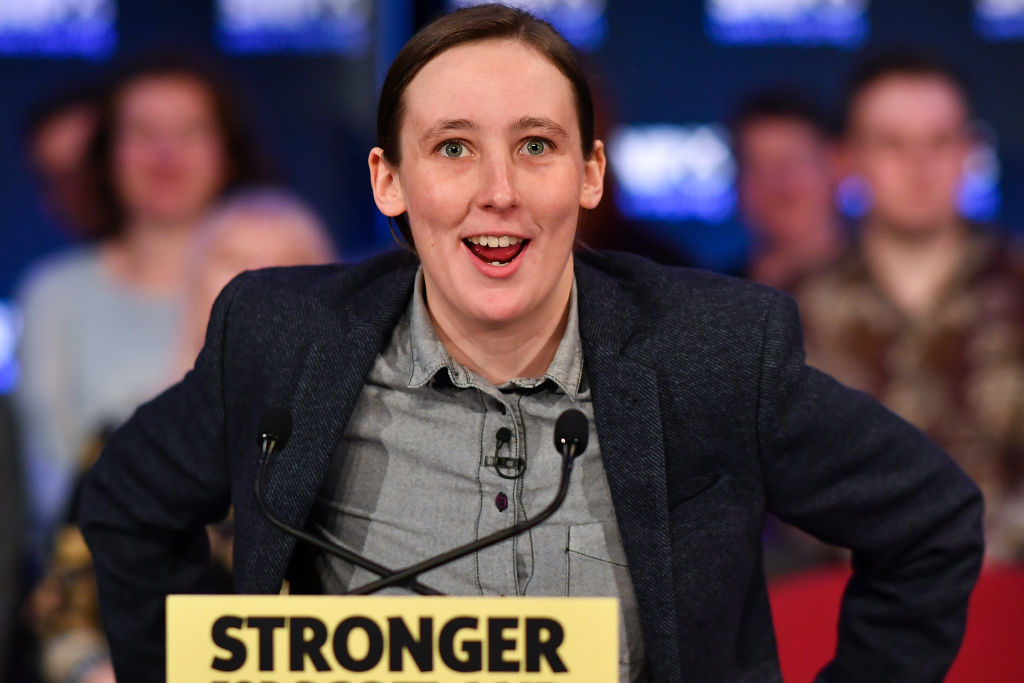I think it was when she described Margo MacDonald as ‘just magic’ that I fell in love with Mhairi Black. As summations of pivotal political figures go, it’s akin to a first-time Labour parliamentary candidate calling Nye Bevan an absolute mad lad. This is how Black speaks, assessing political history as if she’s talking about that time Architects played the Cathouse. It’s not what you might expect from a middle-class lassie from Ralston, but it’s nothing so cynical as an act. Glasgow zillennial patter is a rhetorical mix of imported American sitcoms and a self-consciously Scottish tone. It’s like someone remade The Big Bang Theory with an all-Weegie cast.
I find admirable her record of championing those at the sharp end of life
Black has announced that she won’t contest the next general election, which is why I’m recalling her thoughts on Margo MacDonald. MacDonald, incidentally, was also dismissed early on as brash and vulgar because she talks like a normal person rather than a walking press release. Like MacDonald, Black’s election brought with it a tsunami of media attention. I’m not convinced the SNP did all it could to protect Black, who was, at just 20, the youngest MP elected since 1832. The week after she won, I interviewed her over coffee at Portcullis House. (I say coffee: it was Irn-Bru and crisps. We’re Scottish, deal with it.) I remember thinking at the time that she was too young and too quixotic. Westminster was going to swallow her whole.
In her announcement, made on Tuesday afternoon, Black attacked Westminster as ‘outdated, sexist and toxic’, adding:
‘I have also made clear that I have no desire to have a long career in elected politics, and as we approach the next general election, I will have been elected for almost a decade. I have dedicated a third of my life so far to Westminster – a truly unhealthy working environment.’
This is another reason to like Black: she doesn’t want to be a politician all her life. Nicola Sturgeon says she hopes Black returns to frontline politics one day, and I could certainly see it happening, but I wonder if Holyrood would be a better fit. Her time at Westminster has not been a happy one, as she acknowledges. The media attention has been relentless and the Twitter trolling egregious. Black is a hate figure for ultra-Unionists, with only Sturgeon herself inspiring comparable vituperation. She also references the anxiety her family has felt since the murders of Jo Cox and David Amess. We perhaps forget the impact of those two crimes on MPs.
I’m something of a critic of the SNP – you might have noticed – so my fondness for Black is deemed odd. True, I disagree with her on tonnes: independence, gender self-identification, parliamentary convention, her belief that Britain is on the cusp of ‘fascism wrapped in red, white and blue.’ But there is a gauche sincerity to Black: all the mad stuff she believes she really does believe, and she’s so gallus as to make artifice impossible.
During the 2015 general election, I joined her on the campaign trail, pounding the pavements of her soon-to-be constituency of Paisley and Renfrewshire South. Black, still a politics undergraduate at Scotland’s finest university, subscribed to almost every nostrum of anti-New Labourism, the ideology that has dominated the British left for a quarter century now. There was no problem that couldn’t be taxed, spent or nationalised away. There is an earnest dreaminess to her worldview. She gives idealism a good name.
Black is said to have encouraged young people to become more politically active, and I understand there are those who consider that a good thing. But I find much more admirable her record of championing those at the sharp end of life. Her maiden speech was about a man sanctioned for arriving late to a job centre appointment after fainting from hunger on the bus. Ever since, Black has spoken out against welfare sadism, the flaws in Universal Credit, dependency on food banks and the real people brutalised by poverty and a callous benefits system. These people need all the allies they can get and Black has been with them steadfastly. I have no idea whether, in government, she would have managed to do things differently but, in opposition, she made noise when noise was needed.
Mhairi Black will leave Westminster with no legislative accomplishment to her name, but she will have spent her time there being herself – and being loved and reviled for it. And if all that can be said of her is that, every now and then, she interrupted Parliament with a coarse reminder of the people whose lives were at stake every time MPs strode through the division lobbies, she can be reassured it was a job well done.







Comments